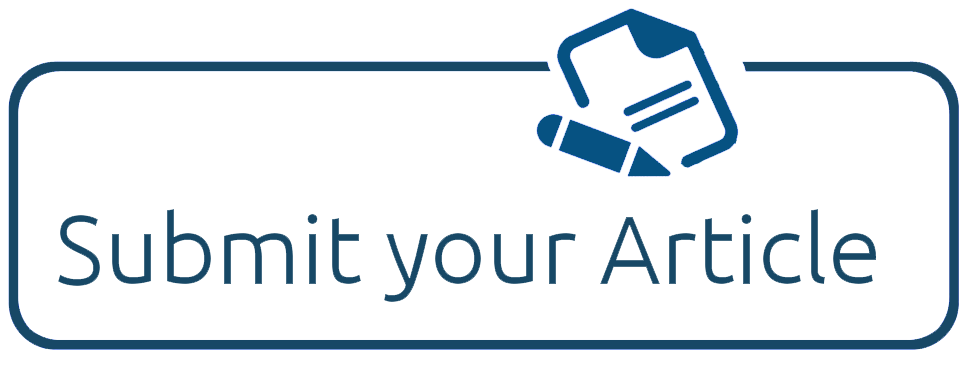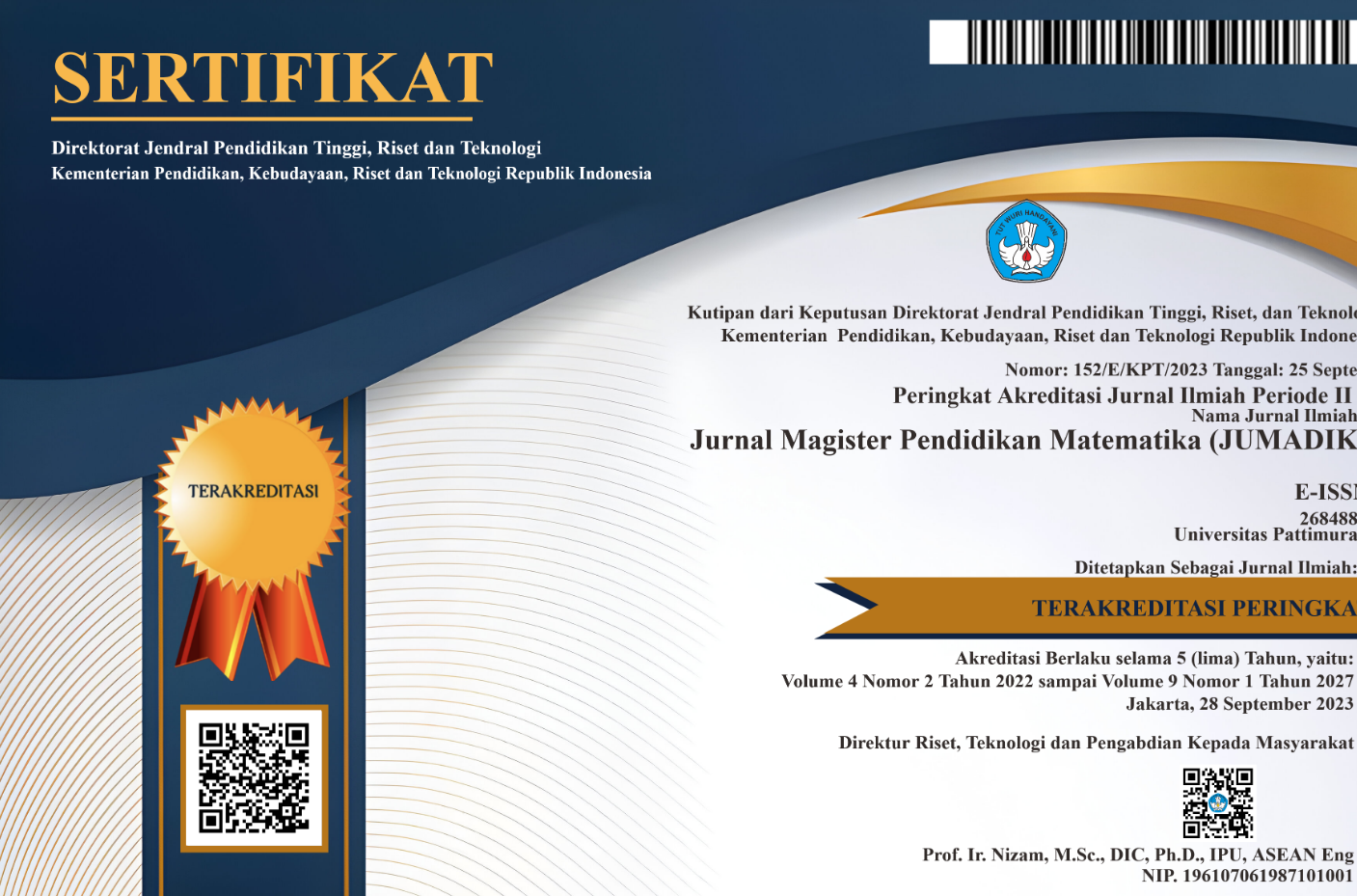KEMAMPUAN KOMUNIKASI MATEMATIS MAHASISWA CALON GURU DALAM MENYELESAIKAN MASALAH MATEMATIKA DITINJAU DARI TIPE KEPRIBADIAN
Abstract
This study aims to describe the mathematical communication skills of prospective teacher students in solving mathematical problems Evaluated from Personality Types (artisan, idealist, guardian, dan rational). This research is a kind of qualitative exploratory research. The subjects used in this study were students of the 4th semester Mathematics Education consisting of 1 student for each type of artisan personality (SA), idealist personality (SI), guardian personality (SG), and rational personality (SR). The selection of research subjects is based on stratified sampling technique then purposive sampling. Data analysis techniques refer to the concept of Miles and Huberman which includes data reduction, data presentation, and drawing conclusions. The data validity technique uses the method triangulation and source triangulation. The results of the research show that: 1) SA meets three indicators namely being able to write information that is known and asked, draw pictures, and do calculations; 2) SI fulfills four indicators which are able to write information that is known and asked, draw pictures, do calculations, and apply mathematical symbols and rules in accordance with the intended problem; 3) SG fulfills three indicators namely being able to make drawings, do calculations, and write symbols and mathematical rules; 4) SR fulfills two indicators namely being able to write information that is known and asked, and doing calculations.
Downloads
References
Armiati. 2009. Komunikasi Matematis dan Kecerdasan Emosional. Prosiding Seminar Nasional Matematika dan Pendidikan Matematika Jurusan Pendidikan Matematika FMIPA UNY. Hlm. 270-280.
Aziz, A., Kusmayadi, T. A., & Sujadi, I. (2014). Proses Berpikir Kreatif dalam Pemecahan Masalah Matematika Ditinjau dari Tipe Kepribadian Dimensi Myer-Briggs Siswa Kelas VIII MTs Nw Suralaga Lombok Timur Tahun Pelajaran 2013/2014. Jurnal Elektronik Pembelajaran Matematika ISSN: 2339-1685, 2(10), 1079–1093.
Dewi, I. 2014. Profil Keakuratan Komunikasi Matematis Mahasiswa Calon Guru Ditinjau dari Perbedaan Jender. Jurusan Matematika Universitas Negeri Medan. Jurnal Didaktik Matematika Vol. 1, No. 2, September 2014. ISSN: 2355-4185.
Dewiyani, S. 2009. Karakteristik Proses Berpikir Siswa Dalam Mempelajari Matematika Berbasis Tipe Kepribadian. Prosiding Seminar Nasional Penelitian, Pendidikan dan Penerapan MIPA Fakultas MIPA, Universitas Negeri Yogyakarta, 16 Mei 2009.
Hodiyanto. 2017. Kemampuan Komunikasi Matematis Dalam Pembelajaran Matematika. Jurnal AdMathEdu Vol 7 No 1.ISSN 2088-687X.
Julita, S., Herawaty, D., & Gusri, S. 2019. PENGARUH KECERDASAN EMOSIONAL, DAN SELF EFFICACY TERHADAP KINERJA GURU MATEMATIKA. JUPITEK: Jurnal Pendidikan Matematika, 2(1), 31-34. https://doi.org/10.30598/jupitekvol2iss1pp31-34
Keirsey, D. 1998. Please Understand Me II Character & Temperament Types. California: Promentheus Nemesis Book Company.
Khamidah Khusnul & Suherman, 2016. Proses Berpikir Matematis Siswa dalam Menyelesaikan Masalah Matematika Ditinjau dari Tipe Kepribadian Keirsey. IAIN Raden Intan Lampung. Al-Jabar: Jurnal Pendidikan Matematika Vol. 7, No. 2, 2016, Hal 231 – 248. P-ISSN 2086-5872, e- ISSN 2540-7562.
Librianti, V.2018. Proses Komunikasi Matematis Siswa SMP Berdasarkan Tipe Kepribadian Keirsey Dalam Menyelesaikan Masalah Terbuka Geometri. Tesis, tidak dipublikasikan. Program Pascasarjana Jember: Jember.
Masrukan, et al. 2015. Analysis of Mathematical Communication Ability Through 4K Model Based on 7th Graders’ Personality Types. International Journal of Education and Research Vol. 3 No. 7 July 2015. ISSN: 2411-5681.
Maya Nis. 2018. Analisis Tipe Kepribadian Siswa Dan Pengaruhnya Terhadap Kemampuan Pemecahan Masalah Matematika Menggunakan Model Problem Based Learning. Universitas Pasundan. Jurnal Symmetry. Volume 3 Nomor 1, Juni 2018 ISSN 2548-2297.
Mufarrihah,. dkk. 2016. Kemampuan Komunikasi Matematis Siswa Kelas IX Sekolah Menengah Pertama Dalam Memecahkan Masalah Matematika Berdasarkan Tipe Kepribadian Siswa. Jurnal Elektronik Pembelajaran Matematika. Jurnal Vol.4, No.7, hal 656-667 September 2016, ISSN: 2339-1685.
Musyrifah, E. 2015. Kemampuan Komunikasi Matematika Pada Pembelajaran Kalkulus Melalui Pendekatan Konstekstual. Jakarta: Fakultas Ilmu Tarbiyah dan Keguruan Universitas Islam Negeri Syarif Hidayatullah. Jurnal Edumatica Volume 05 Nomor 01, April 2015. ISSN: 2088-2157
National Council of Theachers of Mathematics (NCTM) . 2000. Principles and Standards for School Mathematics. USA: The National Council of Mathematics, Inc.
Nuraeni, R. & Luritawaty, I.P. 2016. Mengembangkan Kemampuan Komunikasi Matematik Siswa melalui Strategi Think Talk Write. Jurnal Pendidikan Matematika STKIP Garut. Jurnal Mosharafa Volume 5, Nomor 2, Mei 2016. ISSN 2086 4280.
Panjaitan Binur. 2015. Karakteristik Metakognisi Siswa Dalam Memecahkan Masalah Matematika Berdasarkan Tipe Kepribadian. Universitas Hkbp Nommensen. Jurnal Ilmu Pendidikan, Jilid 21, Nomor 1, Juni 2015, Hlm. 19-28.
Qohar, A. 2011. Mathematical Communication: What And How To Develop It In Mathematics Learning?. International Seminar and the Fourth National Conference on Mathematics Education 2011. Department of Mathematics Education, Yogyakarta State University. Proceeding ISBN : 978 – 979 – 16353 – 7 – 0.
Ramdani, M. 2012. Pengembangan Instrumen Dan Bahan Ajar Untuk Meningkatkan Kemampuan Komunikasi, Penalaran, Dan Koneksi Matematis Dalam Konsep Integral. Jurnal Penelitian Pendidikan Vol. 13 No. 1.
Sugiyono. 2013. Memahami Penelitian Kualitatif. CV. Alfabeta. Bandung.
Sumarmo (dkk). 2018. Hard Skills dan Soft Skills Matematik Siswa. Bandung: Refika Aditama
Utaminingsih, S., & Setyabudi, I. (2012). Tipe Kepribadian dan Prokrastinasi Akademik pada Siswa SMA †X †Tangerang. Jurnal Psikologi Volume, 10(1), 48–57.
Yuwono, A. 2010. Profil Siswa SMA dalam Memecahkan Masalah Matematika ditinjau dari Tipe Kepribadian. Tesis: Program Pascasarjana Pendidikan Matematika Universitas Sebelas Maret Surakarta.
Copyright (c) 2019 JUMADIKA: Jurnal Magister Pendidikan Matematika

This work is licensed under a Creative Commons Attribution-NonCommercial-ShareAlike 4.0 International License.
License and Copyright Agreement
In submitting the manuscript to the journal, the authors certify that:
- They are authorized by their co-authors to enter into these arrangements.
- The work described has not been formally published before, except in the form of an abstract or as part of a published lecture, review, thesis, or overlay journal. Please also carefully read Jurnal Magister Pendidikan Matematika (JUMADIKA) Posting Your Article Policy.
- That it is not under consideration for publication elsewhere,
- That its publication has been approved by all the author(s) and by the responsible authorities – tacitly or explicitly – of the institutes where the work has been carried out.
- They secure the right to reproduce any material that has already been published or copyrighted elsewhere.
- They agree to the following license and copyright agreement.
Copyright
Authors who publish with Jurnal Magister Pendidikan Matematika (JUMADIKA) agree to the following terms:
- Authors retain copyright and grant the journal right of first publication with the work simultaneously licensed under a Creative Commons Attribution-NonCommercial-ShareAlike 4.0 International License (http://creativecommons.org/licenses/by-nc-sa/4.0/) that allows others to share the work with an acknowledgment of the work's authorship and initial publication in this journal.
- Authors are able to enter into separate, additional contractual arrangements for the non-exclusive distribution of the journal's published version of the work (e.g., post it to an institutional repository or publish it in a book), with an acknowledgment of its initial publication in this journal.
- Authors are permitted and encouraged to post their work online (e.g., in institutional repositories or on their website) prior to and during the submission process, as it can lead to productive exchanges, as well as earlier and greater citation of published work.








